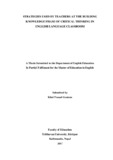Please use this identifier to cite or link to this item:
https://elibrary.tucl.edu.np/handle/123456789/1708| Title: | Strategies Used By Teachers at the Building Knowledge Phase Of Critical Thinking In English Language Classroom |
| Authors: | Gautam, Khul Prasad |
| Keywords: | Strategic Planning;Knowledge;Critical thinking |
| Issue Date: | 2017 |
| Publisher: | Faculty of Education Tribhuvan University, Kirtipur Kathmandu, Nepal |
| Abstract: | This thesis entitled Strategies Used by Teachers at the Building Knowledge Phase of Critical Thinking in English Language Classroom is an attempt to find out the strategies used at the building knowledge phase of critical thinking approach to identify the usefulness of the strategies used at the building knowledge phase of critical thinking approach. In order to achieve the objectives of the study, it was conducted using mixed research design in general and survey research design in particular. All the Secondary level English teachers of Bara District were the population of the study and 25 secondary level English teachers were taken as the sample. They were selected by following purposive non-random sampling method. A set of questionnaire including both open and closed-ended items was used to collect the data from the sample. Similarly, I observed the 25 classes of the selected teachers by using observation checklist. The collected data were analyzed both quantitatively and qualitatively following simple statistical tools as well as item analysis. The research findings showed that the teachers used focus on the text and comprehension of message, contextualization, association of message to the learners‟ experiences, picture description, experience sharing, question sharing, personal connections monitor the activities as the major strategies at the building knowledge phase of critical thinking approach. As a part of the usefulness of the strategies, 83% of the selected teachers view that the strategies help learners to consolidate the learning, enhancing experiences and raising critical consciousness. This thesis consists of five chapters viz introduction, review of related literature and conceptual framework, methods and procedures of the study, analysis and interpretation of results and conclusions and recommendations. The first chapter consists of background of the study, statement of the problem, objectives of the study, research questions, significance of the study, delimitations of the study and operational definition of the key terms. Similarly, the second chapter includes the review of theoretical literature, 10 review of the empirical literature related to this research; implications of the review of the study and conceptual framework of the research. Similarly,chapter three deals with the methodology adopted to carry out the research. It consists of design, and method of the study, population, sample and sampling strategy, study area/filed, data collection tools and technique, data collection procedures and data analysis and interpretation procedures. In the same way, chapter four consists of analysis and interpretation of the data and it also presents summary/discussion of findings. Chapter five consists of the conclusion and recommendations of the study. Recommendations have been presented in policy related, practice related and further related. The final part of the study consists of references and appendices. |
| URI: | http://elibrary.tucl.edu.np/handle/123456789/1708 |
| Appears in Collections: | English Language Education |
Items in DSpace are protected by copyright, with all rights reserved, unless otherwise indicated.

